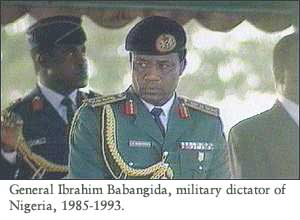Attacks on the Press 2002: Africa Analysis
Although the Kenya-based East African Standard, one of Africa’s oldest continuously published newspapers, marked its 100th anniversary in November, journalism remains a difficult profession on the continent, with adverse government policies and multifaceted economic woes still undermining the full development of African media.
Attacks on the Press 2002: Nigeria
With presidential elections scheduled for April 12, 2003, Nigerian president Olusegun Obasanjo, who survived another impeachment vote in September, must boost his own popularity while maintaining peace in this restive nation, where ethnic and religious violence has left thousands dead in recent years. A retired army general, Obasanjo was elected in May 1999 elections that…
MUSLIM LEADERS ISSUE FATWA ON JOURNALISTPolice detain editor
New York, November 26, 2002—Islamic authorities in the northern Nigerian state of Zamfara issued a fatwa urging Muslims to kill Isioma Daniel, a writer for the private daily This Day, whose November 16 article about the Miss World pageant sparked deadly riots across the country. According to sources in the southern city of Lagos, the…
Newspaper’s offices destroyed by fire
New York, November 20, 2002—The Kaduna offices of the Nigerian private daily This Day were burned down today by Muslim protesters who were angered by a news report the paper published about the Miss World pageant, to be held in the country early in December. Local sources said the protesters were reacting to an article…
Explosion destroys newspaper’s offices
New York, November 20, 2002—On Friday, November 15, an explosion destroyed the offices of the independent weekly National Pilot in Ilorin, the capital of Nigeria’s west central Kwara State. Five people were seriously injured in the blast—which local sources suspected was a politically motivated bomb attack—including the paper’s deputy editor-in-chief, Mudasiru Adewuyi. The explosion occurred…
Attacks on the Press 2001: Africa Analysis
Silence reigned supreme in Eritrea, where the entire independent press was under a government ban and 11 journalists languished in jail at year’s end. Clamorous, deadly power struggles raged in Zimbabwe over land and access to information, and in Burundi over ethnicity and control of state resources. South Africa, Senegal, and Benin remained relatively liberal…
Attacks on the Press 2001: Nigeria
Mirroring the larger society, the Nigerian media were severely fractured along ethnic and regional lines in 2001, although mainstream news outlets remained economically robust, dynamic, and politically outspoken. Throughout the year, a host of new publications hit newsstands, many of them in local languages. In the Christian-dominated south, private radio and television stations expanded their…

FORMER DICTATOR REFUSES TO TESTIFY IN JOURNALIST’S UNSOLVED MURDER
New York, August 27, 2001—CPJ urges former Nigerian military dictator Gen. Ibrahim Babangida to testify before the Nigerian Human Rights Violations Investigations Commission about his alleged responsibility for the 1986 murder of prominent journalist Dele Giwa. “It is time to solve the 15-year mystery of Dele Giwa’s murder,” said CPJ executive director Ann Cooper. “We…
Attacks on the Press 2000: Facts
In North Korea, listening to a foreign broadcast is a crime punishable by death. In Colombia, right-wing paramilitary forces are suspected in the murders of three journalists in 2000. Meanwhile, paramilitary leader Carlos Castaño was formally charged with the 1999 murder of political satirist Jaime Garzón.